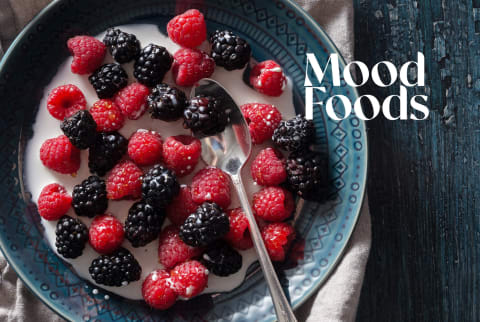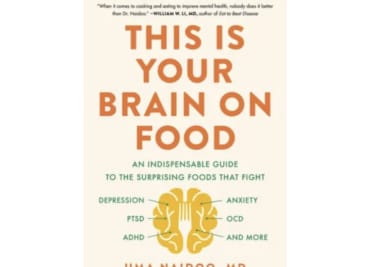A Nutritional Psychiatrist's Top 6 Foods To Help Your Brain Age Well


As a nutritional psychiatrist, I focus on using healthy, whole foods and nutrients to help improve mental well-being. For Dementia Awareness Week, I'd like to take this opportunity to discuss this important condition, as well as methods of caring for, and preserving, brain health through diet.
The link between diet and Alzheimer's disease
Alzheimer's disease is a type of dementia in which the brain cells that govern memory, thinking, and behavior degenerate over time. Tangles of misfolded proteins accumulate in the brain and form the plaque that is one of the physiological hallmarks of this disease.
While there is no known cure for Alzheimer's, treatment is generally focused on reducing inflammation, slowing neurodegeneration, and addressing the symptoms that arise along the way. From the lens of nutritional psychiatry, research has shown that optimizing one's diet can support a healthier mood and healthier brain and reduce the inflammation that is associated with the neurodegeneration that underlies Alzheimer's disease (as neuroinflammation1 is now considered a key factor in the progression of this disease).
In 2009, researcher Veronica Witte, Ph.D., and her colleagues demonstrated that restricting calories by 35% improved memory in healthy elderly patients after three months. But we also know that people feel deprived when they use a method solely based on restricting calories, and they end up unhappy and even anxious. Other ways to get our bodies and minds into a calorie-restriction mode and promote autophagy include intermittent fasting, fasting-mimicking diets, and time-restricted eating.
Another way to do so is actually with food. Nature is brilliant and it turns out that the polyphenols in plants (catechins in green tea, curcumin in turmeric, oleuropein and hydroxytyrosol in olive oil, chlorogenic acid and trigonelline in coffee, resveratrol in red grapes, etc.) can also activate autophagy by mimicking calorie restriction. As I discuss in my book This Is Your Brain on Food, these plant polyphenols are rich in nutrients that fend off dementia, making them brain-healthy picks to add to your plate.
Foods to promote a healthy brain and memory
These are a few of the foods I recommend to support a healthy aging brain:
Berries
By way of their powerful antioxidants and phytonutrients, brightly colored berries (and colorful veggies) can boost memory and promote healthy brain aging2. The high amount of fiber in these vitamin- and mineral-packed foods also shows the gut some love, supporting a healthy microbiome, reducing inflammation, and promoting a better mood.
How to enjoy them
Olive oil
Extra-virgin olive oil is incredibly brain-healthy, and its consumption is linked to lower incidences of Alzheimer's disease3, by way of encouraging autophagy—our own process of cellular "clean up."
How to enjoy it
Avocado
These delicious fruits (yes, fruits!) are rich in omega-3 fatty acids, which show great promise in improving thinking and memory4. Additionally, avocados are rich in key minerals such as potassium and magnesium, which are essential for producing neurotransmitters that govern focus and cognition in the brain.
How to enjoy them
Spices
It only takes a pinch! Spices—like turmeric, black pepper, cinnamon, saffron, rosemary, and ginger—add color and flavor to our food and possess brain-healthy and mood-boosting properties.
How to enjoy them
Leafy greens
Leafy greens are an incredible source of the vitamin folate. Where a deficiency of folate may underlie some neurological conditions, improving folate status has beneficial effects on our brain health and cognitive age5.
How to enjoy them
Coffee
Finally, coffee has also been shown to protect against cognitive decline6 in research. It's best to consume black coffee and limit your intake to a few cups a day in the morning.
The takeaway
What we put on our plates can have a powerful effect on our physical and mental health, especially as we age. By using the principles of nutritional psychiatry, I hope you feel empowered with the knowledge and resources to eat for optimal brain health!

Dr. Uma Naidoo is a Harvard-trained nutritional psychiatrist, professional chef and nutritional biologist & author of the national & international bestseller This Is Your Brain on Food (An Indispensible Guide to the Surprising Foods that Fight Depression, Anxiety, PTSD, OCD, ADHD, and More). And the upcoming title: Calm Your Mind With Food.
She is currently the Founder and Director of Nutritional and Lifestyle Psychiatry at Massachusetts General Hospital (MGH), the first US clinic of its kind where she consults on nutritional interventions for the psychiatrically and medically ill. Naidoo is also a culinary instructor at The Cambridge School of Culinary Arts. She writes for Harvard Health and Psychology Today and has just completed a unique video cooking series for the MGH Academy, which teaches nutritional psychiatry using culinary techniques in the kitchen.

